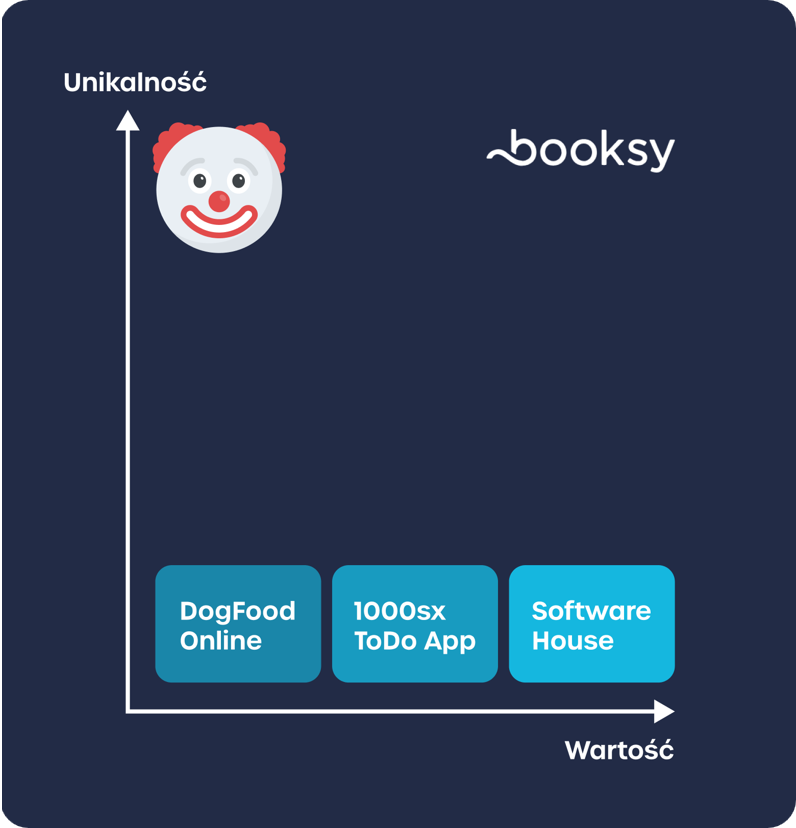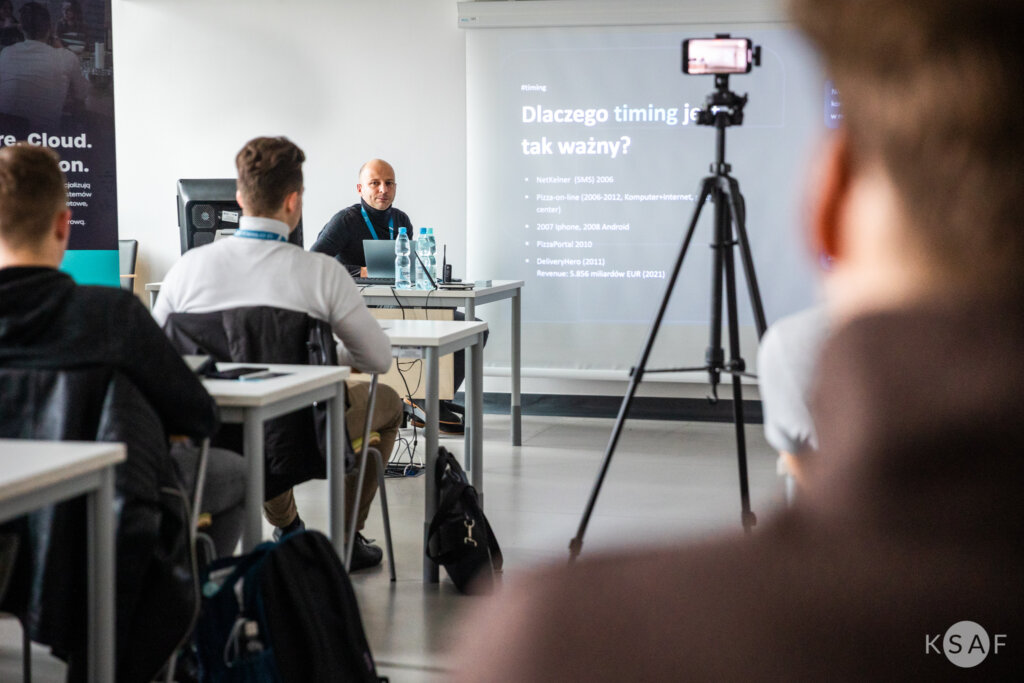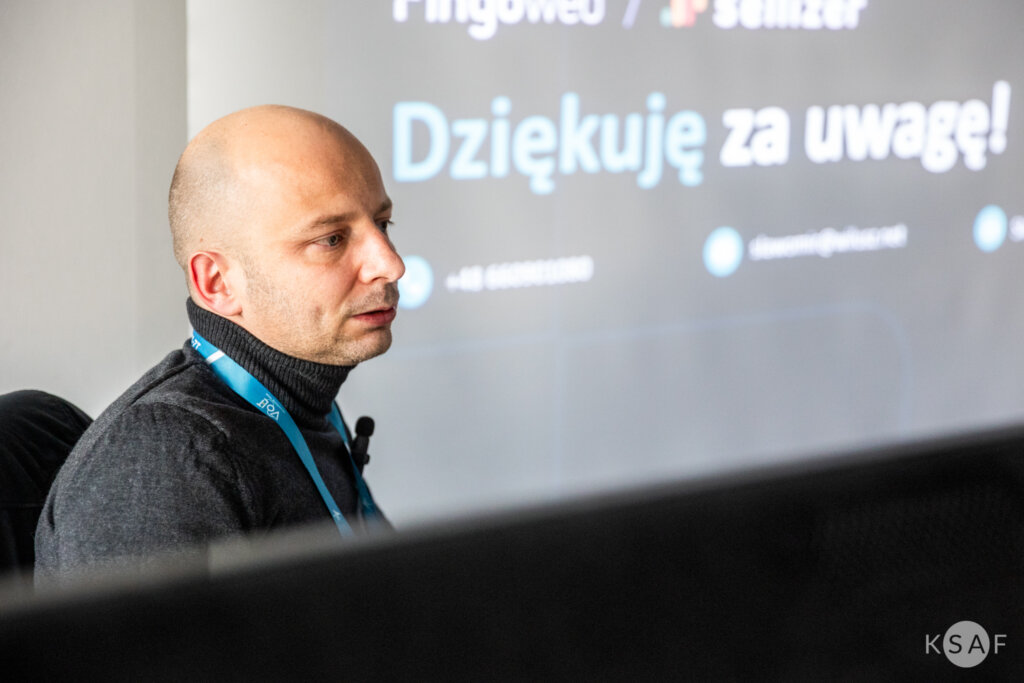In the world of start-ups, where technology is mixed with business, just having a working app is only the beginning of the journey. Sławomir Wilusz, CEO of Fingoweb, shared invaluable tips on how to turn an application into a source of revenue and make it a success in the market during his speech at AGH in Krakow.
In this article you will learn:
- Where to get an idea for a startup?
- How to build a good team?
- At what point is it best to start your business?
- How to find customers?
- Where to get money for your first startup?
- What to keep in mind when building a startup?
Idea: Heart of Startup
When does it make sense to build your own business?
When considering starting your own business, it’s crucial to identify the unique value we can deliver to the market. Consider whether you have a solution to a problem that is not only innovative, but also able to attract paying customers. But an equally important aspect is the willingness and readiness to build a business that has the potential to bring in more income than would be possible in a traditional employment relationship.
Building your own business involves risk and uncertainty, but it also opens the door to potentially unlimited income opportunities. A salaried job can offer stability and predictability, but usually limits our income to a set salary. Our own business offers the opportunity to enjoy the fruits directly from our work, innovation and strategic decisions.
When making your decision, it’s worth considering whether you’re willing to devote time, energy and resources to building something that may not generate income at first, but in the long term has the potential to become a source of income that exceeds your full-time salary.
Where to get a good idea for a startup?
Problem solving: The key to finding a good idea is to focus on the problems that people face every day. The best ideas are often born out of the need to solve these problems in innovative and effective ways. Conversations with experts from different industries can reveal specific challenges that have not yet been adequately addressed by existing products or services.
Expert in the field: An expert who points out a problem can be either an external person or the founder himself, if he has deep knowledge and passion in a specific topic. Being a subject matter expert or having a deep interest in a particular field increases the understanding of the specific problems users face and facilitates the creation of effective solutions.
Execution of the idea
While the idea is important, its execution is critical to success. “There are many ideas, but executing one of them in a way that actually solves a problem takes work, determination and continuous improvement,” says Sławomir Wilusz. The ability to adapt, listen to feedback and evolve an idea in response to market needs is what separates successful startups from those that fail to achieve their goals.
Value vs. uniqueness of the idea
Below you’ll find a chart that helps you understand where in the market you position an idea in terms of its customer value and uniqueness compared to the competition. Ideally, you want to be in a quadrant that represents high customer value and high uniqueness like for example Polish platform Booksy. This means that you offer something that others don’t have, and something that customers are willing to pay for.

Team: Strong Foundation
The development of a startup often begins with the idea of one person, but it is the team that determines its future success. Sławomir Wilusz emphasizes the importance of a balanced team, where each member brings unique value. When considering the structure of a team, there are several key aspects to consider.
Is it worth it to go solo?
Going solo has its advantages, such as full control over project direction and speed of decision-making. However, as our CEO notes, one-person projects also bring limitations – less diversity of perspectives, more responsibility, and limited time and skill resources. In many cases, teams are able to accomplish more by combining different talents and experiences.
Which roles should there be in the team?
The startup’s team structure should reflect the key needs of the project. Slawomir Wilusz identifies three main roles:
- Hacker (Technologist): creator, programmer, person responsible for technical development of the product. It is crucial that he or she has not only technical skills, but also the ability to think innovatively and solve problems.
- Hipster (Product Visionary): Responsible for the overall vision of the product. This person must have a good understanding of the market and user needs in order to guide product development in a way that best meets those needs.
- Hustler (Sales/Marketer): a person focused on business, sales, marketing and customer acquisition. This person’s job is not only to promote the product, but also to build relationships with customers and business partners.
Roles can intersect, especially in the early stages of a startup, where everyone can multitask across functions.
In detail about the roles in a technology startup we describe in the article Key Roles in a Technology Startup.
How do you select partners for your startup?
The selection of partners is a key moment in the life of a startup. When selecting partners, one should be guided not only by common goals, but also by complementary skills and characters. It is important that there is mutual trust and open communication between partners. Look for people who share your passion for the project, but at the same time can bring new perspectives and solutions to the team.
As Sławomir Wilusz says, it is crucial that each team member is the best at what they do, but it is equally important that everyone shares a vision and is committed to achieving it.
Timing: the Importance of the Right Moment
In a journey through the meanderings of creating a startup, one of the most instructive stories is the one about Sławomir Wilusz’s attempt to create a portal for ordering food online, back before the smartphone era. This story is a great example of how crucial timing is to the success of any venture.

Beginnings of idea
It all started in 2006, when Sławomir, inspired by the rapidly developing Internet technology, decided to realize an idea that seemed futuristic – a platform for ordering food online. The market was just crawling with the digitization of services, and the idea of placing an order at your favorite restaurant with a few clicks seemed innovative and promising.
Technological challenges
The first challenge was technology. Smartphones were not yet common, and internet access had its limitations. Most potential users did not have handy access to the Internet outside the home, and the idea of ordering food online was difficult to implement when users had to use desktop computers.
Market launch
Despite facing adversity, Sławomir Wilusz and his team made an effort to create and market the portal. The process involved convincing restaurants to cooperate, which was quite a challenge. Restaurant owners, who were used to traditional methods of taking orders, were skeptical about the idea of digitizing the process. Our CEO faced not only technical limitations, but also a mental barrier in the restaurant industry.
Change on the horizon
Then came the era of smartphones. These devices revolutionized the way people used the Internet, offering new opportunities for online businesses, including ordering platforms. The market was suddenly ready to embrace such services, but Sławomir was already facing new challenges.
Competition and reflections
When technology caught up with Sławomir’s vision, new companies with powerful financial and technological support entered the market. His idea, though pioneering, began to lose its uniqueness. Confronting powerful competition and understanding that timing is a key element of success became valuable lessons.
Lessons for the future
This story is a reminder that even the most innovative idea needs the right moment in the market to blossom. Sławomir teaches us that the key to success is not only identifying a niche and developing technology, but also being able to predict when the market will be ready to accept a new product or service. This story underscores the importance of having a flexible approach to business, being ready to adapt and constantly keeping up to date with changing trends and technologies. It’s a warning not to underestimate timing, but also an inspiration to look for new opportunities, even when the first attempts don’t work.
Business Model: How to Monetize an Application?
How to find customers?
Finding the first customers is one of the biggest challenges startups face. Sławomir Wilusz stresses that the process requires a strategic approach and avoiding common pitfalls. Here are some key tips and warnings:
- Define your niche: Our CEO notes the importance of precisely defining your target audience. Instead of trying to appeal to everyone, focus on the specific group that will benefit most from your product.
- Solve real problems: Your app or product should solve a specific problem that is real to your potential customers. Showing how your solution makes life or work easier is key.
- Building relationships: Initial customer acquisition is often based on face-to-face relationships. Networking, attending industry events or even direct email contact can be valuable tools in the hands of a startup.
- Use of social media and content marketing: Having a social media presence and creating valuable content is a way to build brand awareness and interest among potential customers.
What not to do:
- Don’t ignore feedback: The speaker warns against ignoring feedback and suggestions from early users of your product. This feedback is priceless in the process of improving your product and adapting it to market needs.
- Don’t assume that the product will sell itself: Many startups make the mistake of assuming that simply having an innovative product is enough to attract customers. Slawomir stresses that without an effective marketing and sales strategy, even the best product can go unnoticed.
- Don’t underestimate the importance of personalization: Treating all potential customers the same way is a mistake. Different customers may have different needs and expectations of your product. Tailoring your communications and offerings to a specific market segment can greatly increase the effectiveness of your efforts.
- Don’t neglect the sales process: Winning a customer is just the beginning. Slawomir points out the importance of building long-lasting relationships with customers, which requires maintaining quality customer service and continuously delivering value.
What indicators to use to measure startup success?
- CAC (Customer Acquisition Cost): the cost of acquiring a customer.
- LTV (Lifetime Value): the total value a customer brings over the lifetime of the product/service.
- Churn Rate: customer churn rate.
How much to bet on sales and marketing?
Investments in sales and marketing should be proportional to expected customer LTV returns. As a rule, after the initial testing phase, companies can spend much more on these areas than initially expected to scale their market presence.
Funding: Fuel for Startup Growth
Finding funding for your idea is a key element in the development of a startup. Sławomir Wilusz stresses that there are a number of paths that can lead to obtaining the necessary funds for startup and development. Here is a detailed overview of the funding opportunities he mentioned, along with their characteristics and tips on how to use them.
Bootstrapping
Bootstrapping, or financing a project with your own funds or with profits generated by the business, is often the first step for many startups. This method allows full control of the project without the need to share ownership or decisions with outside investors. Our CEO stresses that bootstrapping requires careful financial planning and often means slower development, but offers greater independence.
Business Angels
Business angels, or private investors, are another option for startups seeking funding. They are usually experienced entrepreneurs or professionals who, in addition to capital, can also offer their knowledge, experience and business contacts. While seeking business angels, it is important to focus on building relationships and look for investors who share the company’s vision and can actively contribute to its growth.
Venture Capital
Venture capital (VC) funds are professional investment firms that specialize in investing in promising early-stage startups. While getting funding from VCs can be more difficult and require proof of market potential and business scalability, it can greatly accelerate a company’s growth. The key to success along this path is careful preparation and presentation of a business plan that will convince potential investors of the value and uniqueness of the project.
Grants and competitions for startups
Grants from government or EU programs, as well as winning startup competitions, can be a valuable source of funding. These funds often do not require giving up shares in the company or repayment, making them an attractive option for growing businesses. Sławomir encourages active exploration of available programs and participation in competitions, which can provide not only funding, but also valuable visibility and networking.
Learn more about the options for getting funding for your startup!

Final Thoughts
When developing a startup, it is important to keep in mind Sławomir Wilusz’s advice and insights from his extensive practice and experience. Every aspiring startup founder should reflect on these tips to better understand and navigate through the complex process of building their own business.

It’s simple, but not easy
At first glance, the process of creating and developing a startup may seem simple – just have an idea, assemble a team, create a product and bring it to market. However, reality quickly verifies this perspective. Technical challenges, changing market conditions, competition or even internal team dynamics can make the road to success more complicated than initially anticipated.
Don’t give up
The road to success is bumpy and often requires overcoming many obstacles. It is important not to give up at the first failure. Each failure brings with it a valuable lesson that can bring you closer to ultimate success. Persistence and determination in pursuit of your goal are key.
When to let go?
However, it is equally important to recognize when to revise a strategy or even let go of a certain course of action. Not all projects will be successful, and sometimes the best decision is to focus on new ideas or approaches. Letting go doesn’t mean failure, but rather managing resources wisely and adjusting to the realities.
Startups are a marathon, not a sprint, but still a race
Developing a startup is a long-term process that requires patience and perseverance. It’s a marathon in which success builds gradually, rather than the result of immediate action. However, even though it’s a marathon, one should not forget that we are in a race – against the competition, against time, against our own expectations. Speed matters, and the ability to learn quickly and adapt to changing conditions can determine market advantage.
Summary
When developing a startup, it’s worth remembering that the road to success requires not only an innovative idea and technological skills, but also strategic planning, understanding of the market, adaptability and above all – perseverance and a willingness to continuously learn. The process can be challenging, but also extremely rewarding.
By following these tips and learning from the experiences of others, you can increase your chances of success in the challenging world of startups.
Do you have questions or would like to consult your ideas?
Make an appointment for a free consultation with Sławomir!
Write to slawomir.wilusz@fingoweb.com
or call: +48 660 901 080








